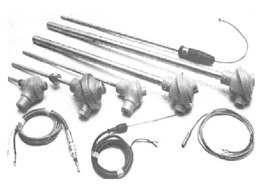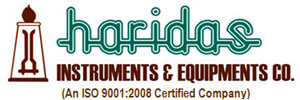Our Products
Haridas Temperature Measuring Instruments

Selection Guide for Bi-Metallic Dial Thermometers
THERMOCOUPLES
Thermocouples are extremely robust and offer the highest level of tolerance to shock and vibration. The various types cover a temperature range from -270°C to +1700°C. They can be produced in extremely small diameters where speed of response is a critical factor.
Sheath Materials
A wide range of standard sheath materials are available, including Stainless Steel Types 310, 316 and 321, Inconel 600, Re-crystallised Alumina, Ceramic etc.
| THERMOCOUPLE TYPES | ||
|---|---|---|
| International Symbol | Names of Materials | Useful Application Range |
| B | Platinum30% Rhodium (+) Platinum 6% Rhodium (-) |
2500 -3100°F 1370-1700°C |
| E | Chromel (+) Constantan (-) |
200-1650°F 95-900°C |
| J | Iron (+) Constantan (-) |
200-1400°F 95-760°C |
| K | Chromel (+) Alumel (-) |
200-2300°F 95-1260°C |
| R | Platinum 13% Rhodium (+) Platinum (-) |
2640°F 870-1450°C |
| S | Platinum 10% Rhodium (+) Platinum (-) |
1800-2640°F 980-1450°C |
| T | Copper (+) Constantan (-) |
-330-660°F -200-350°C |
RESISTANCE TEMPERATURE DETECTORS (RTDs)
Platinum Resistance Sensors offer the highest standard of accuracy and stability of any temperature sensor. They exhibit good linear response, covering a range from -200° C to +650° C. They require no special cables or cold junction reference.
Conductors
Standard RTD's are 100 ohms at 0° C, in two, three or four wire configuration. Single and Duplex type RTD's are available as standard.
Sheath Materials
A wide range of standard sheath materials are available, including Stainless Steel Types 316 and 321 and Inconel 600.
